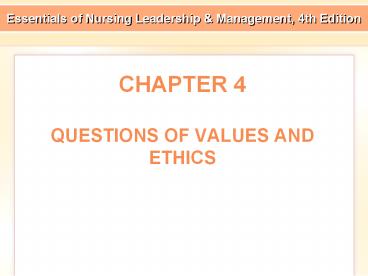CHAPTER 4 QUESTIONS OF VALUES AND ETHICS - PowerPoint PPT Presentation
Title:
CHAPTER 4 QUESTIONS OF VALUES AND ETHICS
Description:
... to life-and-death issues Ethical Theories Deontological Teleological Principalism Ethical Principles Autonomy Nonmaleficence Beneficence Justice Fidelity ... – PowerPoint PPT presentation
Number of Views:193
Avg rating:3.0/5.0
Title: CHAPTER 4 QUESTIONS OF VALUES AND ETHICS
1
CHAPTER 4QUESTIONS OF VALUES AND ETHICS
2
INTRODUCTION
3
In the beginning
- There were no antibiotics
- There were no ICUs
- There were no CT scanners and MRIs
- There were just physicians and nurses who cared
for people in sickness and in health
4
1960s
- Technological advances allowed for the
development of intensive care units - New biomedical developments
- Advances in surgical techniques, such as open
heart surgery
5
New Questions
- The advances created new questions for
health-care professionals regarding the use of
technology - The concepts of life and death
6
Bioethics
- A subdiscipline of ethics
- The study of medical morality
7
Concepts of Ethics
- Values
- Belief systems
- Morality
8
Value Systems
- A set of related values
- Intrinsic values
- Extrinsic values
- Personal values
- Professional values
9
Value Formation
- Values are learned
- Values change with maturity and experience
- The number of values an individual holds is not
as important as what values they consider
important
10
Values Clarification
- Choosing
- Prizing
- Acting
11
Belief Systems
- These are organized ways of thinking about why
people exist within the universe - Their purpose is to explain such concepts as
- Life and death
- Good and evil
- Health and illness
12
ETHICS AND MORALS
13
Morals
- An individuals own code for acceptable behavior
- They arise from an individuals conscience
- They act as a guide for individual behavior
- Learned
14
Ethics
- Ethics deals with the rightness or wrongness
of human behavior - Concerned with the motivation behind the behavior
- Bioethics is the application of these principles
to life-and-death issues
15
Ethical Theories
- Deontological
- Teleological
- Principalism
16
Ethical Principles
- Autonomy
- Nonmaleficence
- Beneficence
- Justice
- Fidelity
- Confidentiality
- Veracity
- Accountability
17
Autonomy
- The freedom to make decisions about oneself
- Nurses need to respect clients rights to make
choices about health care
18
Nonmaleficence
- Requires that no harm be caused to an individual,
either unintentionally or deliberately - This principle requires nurses to protect
individuals who are unable to protect themselves
19
Beneficence
- This principle means doing good for others
- Nurses need to assist clients in meeting all
their needs - Biological
- Psychological
- Social
20
Justice
- Every individual must be treated equally
- This requires nurses to be nonjudgmental
21
Fidelity
- Loyalty
- The promise to fulfill all commitments
- The basis of accountability
22
Confidentiality
- Anything stated to nurses or health-care
providers by clients must remain confidential - The only times this principle may be violated
are - If clients may indicate harm to themselves or
others - If the client gives permission for the
information to be shared
23
Veracity
- This principle implies truthfulness
- Nurses need to be truthful to their clients
- Veracity is an important component of building
trusting relationships
24
Accountability
- Individuals need to be responsible for their own
actions - Nurses are accountable to themselves and to their
colleagues
25
Ethical Codes
- These are formal statements of the rules of
behavior for a particular group of individuals - Ethical codes are dynamic
- Most professions have a code of ethics to guide
professional behavior
26
Virtue Ethics
- Focus on virtues or moral character
- View helping others as charitable or benevolent
27
Organizational Ethics
- Focus on the workplace
- Ethical culture makes a difference
- Senior leadership must promote an ethical culture
28
Ethical Dilemmas
- Occur when a problem exists between ethical
principles - Deciding in favor of one principle usually
violates another - Both sides have goodness and badness
associated with them
29
Resolving Ethical Dilemmas
30
Using the Nursing Process
- Assessment
- Planning
- Implementation
- Evaluation
31
Approach to Ethical Dilemma
32
Current Ethical Issues
33
Issues to Consider
- Assisted suicide
- Technology issues
- Gene therapies
- Designer babies
- Organizational climate
34
Conclusion
- An issue is not an ethical issue for the nurse
unless he or she has been asked - Always gather the facts prior to decision-making
- Consider your personal beliefs and values































